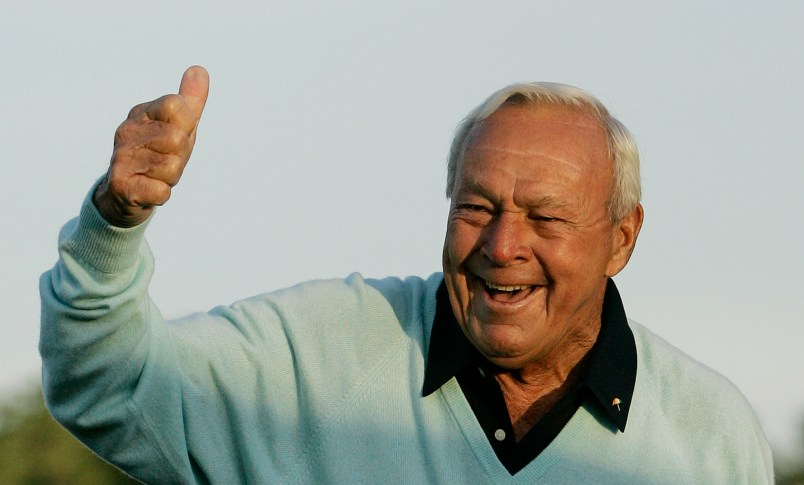Arnold Palmer charged across the golf course and into America’s living rooms with a go-for-broke style that made a country-club sport popular for the everyman. At ease with presidents and the public, he was on a first-name basis with both.
He never lost that personal touch. That’s what made him the King.
Palmer died Sunday in Pittsburgh at 87. Alastair Johnston, the CEO of Arnold Palmer Enterprises, said Palmer was admitted to the UPMC Hospital on Thursday for cardiovascular work and weakened over the last few days. Palmer was diagnosed with prostate cancer in 1997, which was caught early.
“Arnold transcended the game of golf,” Jack Nicklaus said. “He was more than a golfer or even great golfer. He was an icon. He was a legend.”
President Barack Obama tweeted: “Here’s to The King who was as extraordinary on the links as he was generous to others. Thanks for the memories, Arnold.”
Palmer’s place in golf history went well beyond his seven major championships and 62 PGA Tour wins. His good looks, devilish grin and hard-charging style of play made the elite sport appealing to all. He arrived about the time television moved into most households.
“If it wasn’t for Arnold, golf wouldn’t be as popular as it is now,” Tiger Woods said in 2004 when Palmer played in his last Masters. “He’s the one who basically brought it to the forefront on TV.”
Palmer also was a pioneer in sports marketing, paving the way for many athletes to reap in millions from endorsements. Some four decades after his last PGA Tour win, he ranked among golf’s highest-earners.
“It is not an exaggeration to say there would be no modern-day PGA Tour without Arnold Palmer. There would be no PGA Tour Champions without Arnold Palmer. There would be no Golf Channel without Arnold Palmer,” PGA Tour Commissioner Tim Finchem said in a statement.
It was, of course, not just the victories, but how he won. He would hitch up his pants, drop a cigarette and attack the flags. With powerful hands wrapped around the golf club, Palmer would slash at the ball, twist that muscular neck and squint to see where it went.
“When he hits the ball, the earth shakes,” Gene Littler once said.
He was never dull. Consider that Palmer rallied from seven shots behind to win a U.S. Open. He blew a seven-shot lead on the back nine to lose a U.S. Open.
He left behind a gallery known as “Arnie’s Army,” which began at Augusta National with a small group of soldiers from nearby Fort Gordon and grew to include legions of fans from around the globe.
Palmer stopped playing the Masters in 2004 and hit the ceremonial tee shot every year until 2016, when age began to take a toll.
He never won the PGA Championship, one major short of a career Grand Slam. But then, the standard he set went beyond trophies. It was the way he treated people, looking everyone in the eye with a smile and signing every autograph, making sure they were legible. He never liked “The King” label but it stuck.
“I don’t relish it,” he told The Associated Press in 2011. “I tried for a long time to stop that, and there was no point.”
Palmer played at least one PGA Tour event every season for 52 consecutive years, ending with the 2004 Masters. He spearheaded the growth of the 50-and-older Champions Tour, winning 10 times.
He was equally successful in business off with golf course design, a wine collection and apparel that included his famous logo of an umbrella. He bought the Bay Hill Club & Lodge upon making his winter home in Orlando, Florida. In 2007, the PGA Tour changed the tournament’s name to the Arnold Palmer Invitational.
Palmer was born Sept. 10, 1929, in Latrobe, Pennsylvania, the oldest of four children. His father, Deacon, became the greenskeeper at Latrobe Country Club in 1921 and the club pro in 1933.
Palmer joined the PGA Tour in 1955 and captured the Canadian Open for his first title. He won four green jackets at Augusta National, the British Open in 1961 and 1962 and the U.S. Open in 1960.
Palmer’s last PGA Tour win came in 1973 at the Bob Hope Classic. Only four other players won more PGA Tour events — Sam Snead, Nicklaus, Woods and Ben Hogan.
Palmer’s first wife, Winnie, died in 1999. They had two daughters, and grandson Sam Saunders plays on the PGA Tour. Palmer married Kathleen “Kit” Gawthrop in 2005.
Details on a memorial service and burial are to be announced.
Copyright 2016 The Associated Press. All rights reserved. This material may not be published, broadcast, rewritten or redistributed.



